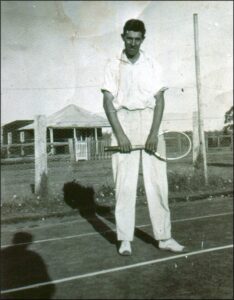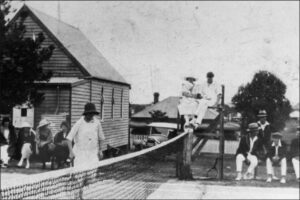Compiled by Rosemary Phillis
Local history has often featured in the education of children at the various local schools at Riverstone. From time to time interview sheets were developed and older members of the community shared their memories. The following information is based on the answers from a interview sheet covering the memories of Bill Vaughan. It is likely that his wife Dorothy would have been involved in the interview. Bill was born in Riverstone in 1901 and died in 1982.
The interview is likely to have taken place in the last 1970s, early 1980s.
My name is William Alfred Dawson Vaughan. I was one of three sons born to Edward and Mary Vaughan.
THE DEPRESSION
I remember the Depression. We lived at 21 Oxford Street Riverstone. We had one daughter who was born during the Depression.
How did the Depression affect our family? Things were at a standstill. We lived day to day, but we were never short of the necessities. Food was sold as cheap as possible. We purchased food from my father’s shop. Clothes and the barest necessities were purchased at Riverstone and Parramatta.
We did work through the Depression, but the work was mainly casual and the amount earned varied. I had a number of jobs during 1929 and 1936. Being a carpenter and joiner I made furniture, flyscreens and repairs for various friends and relations who were not out of work. I was given work at Parramatta with the firm I had served my apprenticeship with. They got me work with another firm of joiners. When that finished I was lucky to be given a job as a maintenance carpenter at the Riverstone Meatworks and was there 30 years.
One was very thankful to do any work available, so I enjoyed my work.
There were families worse off than we were; those who had no work or had large families.
TRANSPORT
We had no private transport. The railway was the only form of public transport. It was a poor train service, all steam trains and mainly box carriages. The fares were reasonable and in keeping with wages.
RELIGION
We went to church at the local Presbyterian Church in Garfield Road, which was not far from where we lived. The minister came from Windsor as we were in the Windsor Parish. The service was at 3 pm in the afternoon.
SCHOOL
Our daughter was too young for school during the Depression. As for the children at school I think they enjoyed it. There was a large emphasis on reading, writing and arithmetic. They didn’t have uniforms, they wore whatever clothes they had.

Photo: Vaughan family

HOUSING
Our house was built in 1926. It was made of weatherboard and fibro and had an iron roof. I built the house with the help of my brother.
ENTERTAINMENT
We were perfectly happy, making our own amusement. Riverstone had many tennis courts. We played Tennis Tournaments in Blacktown District Competitions. Also there were Women’s Tennis Days and Tournaments. Many were run to raise church funds.
There were regular dances and occasional balls. We had card afternoons and evenings.
CLOTHING
During the Depression fashion remained fairly static as there was not much money for new clothes. By today’s standards clothing was cheap, but as the basic wage for men was only £3-10-0 a weekly, the prices were reasonable. Tradesmen earned £5 per week.
Men worked in cotton work trousers and shirts and work shoes or boots. They dressed up for tennis in creams and silk shirts and sandshoes. They wore sports coats and slacks or suits for outings. They also wore hats.
Women mostly wore cotton for ordinary wear. There were no wash and wear materials, so best clothes had to be dry cleaned. Women never went out dressed for shopping, visiting or going to Sydney without wearing hats and gloves.
MY MOST VIVID MEMORIES OF THE DEPRESSION
Many suffered far more than we did. The Dole was not always a handout, the Council had men working on the roads and footpaths. Riverstone had a much smaller population and as the Meatworks is here, many got some work, if not permanent.
Many couples who had only been married a few years were unable to pay their loans and lost their homes. Those paying rent often went home to their parents. Also couples with furniture etc on time payment had it repossessed, so they lost all they had paid. I would hate to see another depression, but personally I feel that it taught our generation a hard lesson, but made us appreciate the good times.
In our time everything was cheaper and wages small, but money was worth more. High wages only bring higher costs. So where is the gain? We were satisfied with less but we were just as happy.
